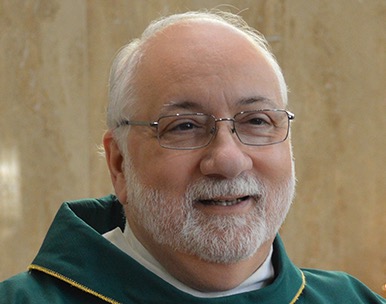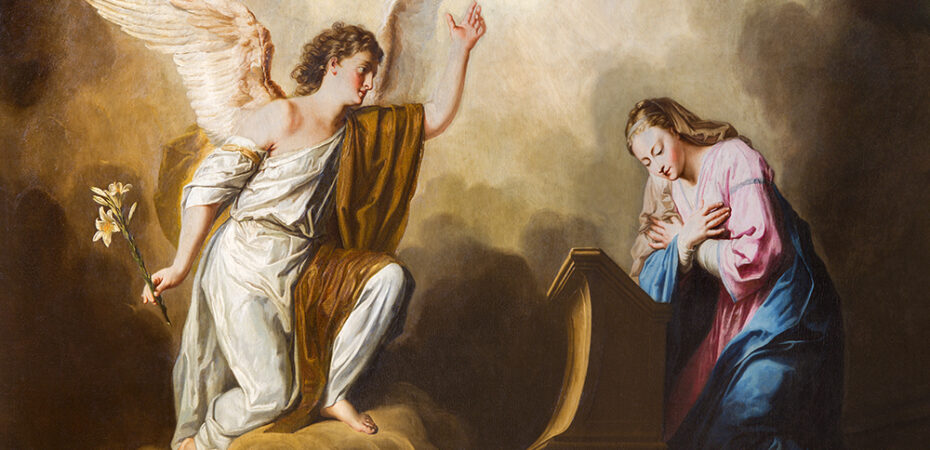A Meditation on Mary and the Diaconate
Mary provides a perfect example as we exercise our diaconate
Deacon Dominic Cerrato Comments Off on A Meditation on Mary and the Diaconate
 In the first chapter of St. Luke’s Gospel, just after the narrative of Zechariah and Elizabeth, we read of another angelic visit, this time to a virgin betrothed to a man named Joseph.
In the first chapter of St. Luke’s Gospel, just after the narrative of Zechariah and Elizabeth, we read of another angelic visit, this time to a virgin betrothed to a man named Joseph.
The heavenly apparition would have come as a shock to the young woman, though perhaps not nearly as shocking as the angel’s greeting, “Hail, favored one! The Lord is with you” (Lk 1:28).
Luke tells us that Mary was troubled by these words and pondered the meaning. The Church has long held that, in many respects, Mary was prepared for this event from the moment of her conception. Still no preparation, no matter how complete, could make her fully ready for what was about to happen. Who could have imagined that the transcendent God of the Old Testament would have bridged heaven and earth by becoming one like us in all things but sin? Who would have anticipated that the sublime God of Abraham, Isaac and Jacob would have allowed us to enter his presence by entering ours?
Returning to Luke’s account the angel said to her: “Do not be afraid, Mary, for you have found favor with God. Behold, you will conceive in your womb and bear a son, and you shall name him Jesus” (1:30-31).
In many ways, Gabriel’s words represent a divine commission, one in which the salvation of the world hinged. This commission was given to Mary in such a way that while much was revealed, much still remained hidden. If accepted, it would inalterably change her life and, at the same time, change the very course of humanity.
In this respect, Mary’s commission is the model of how God works with humanity, and how humans may respond. This is as true with great commissions like that given by the angel, and little ones, like the one given to us through ordination. To be sure, there is a great difference between what Mary was called to and what we are called to, but both share a similar end, to seek and do the will of God.
In following the will of God, Mary describes herself as the doulē kyrios, often translated in English as servant or slave of the Lord. It connotes the willingness to serve the one who commissions her with her entire being. This willingness reveals, in a palpable way, a servant’s heart, one whose obedience arises not out of a sense of blind religious duty, but out of a duty that flows from a tender love for the one who commissions her. This distinction is essential and marks the definitive characteristic of the diaconate.
Properly understood, diakonia is not merely the doing of something but, as in Mary’s case, the giving of someone — that is, her very self. In this way, authentic diaconal ministry can be described as a salvific gift of self that wills the happiness of another for the sake of the other. Consequently, it is nothing less than an expression of authentic love, often entailing considerable sacrifice (cf. Lk 2:35). Indeed, this is precisely what Mary modeled by her life, and precisely what her son does in a preeminent way through the Paschal Mystery. Of course, none of this would be possible without her free choice, a choice expressed in her fiat. A loving God does not force himself on those he loves, but rather invites them to share in his life. Mary understood this and, joining her life to his, said, “Behold, I am the handmaid of the Lord. My it be done to me according to your word” (1:38).
At that moment, a great divide was bridged. Heaven came to earth as the Logos took on human nature while still being fully divine. He came to speak with human words, to touch with human hands, to weep with human tears and to shed human blood. He enters our world and takes on our pathos so that we can enter his. This singular act of love, a love by which all others are measured, while entirely priestly, is also diaconal, for it is a salvific gift of self that wills the happiness of another for the sake of the other.
Both Mary, and particularly her son, lived this as an example for us. Indeed, just as her “yes” enabled her to bear in her own body Christ, so, too, we who say “yes” to our vocation, and again in our ordination, bear in our bodies that very same Christ. That yes allows the Holy Spirit to impregnate us with the Word now made flesh in us, in the choices we make and the lives we lead.
Mary provides a perfect example for us as we exercise our diaconate in two respects. First, though she herself was not a deacon, she nonetheless provides the perfect model of diakonia especially as it is grounded in the love of her son. Second, as Mother of Christ who came not to be served but to serve (cf. Mk 10:45), she is mother of the Diakonos and all who are configured to him through ordination to the diaconate. Both of these make it quite appropriate to invoke her patronage as we seek to fulfill our charge. In doing so, it is fitting that to her many titles we add still another, Mater Diaconati (Mother of the Diaconate).
DEACON DOMINIC CERRATO, Ph.D., is editor of The Deacon and director of diaconal formation for the Diocese of Joliet, Illinois. He is the founder of Diaconal Ministries, where he gives national presentations and retreats to deacons and diaconal candidates. Follow him on Facebook to continue the conversation.





